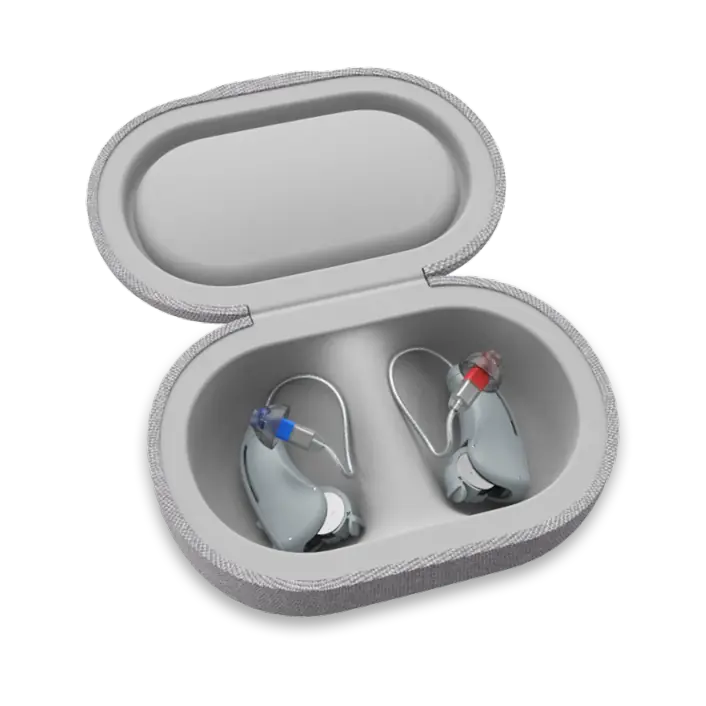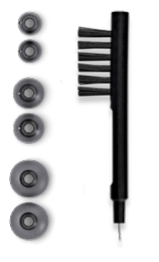Have you canceled dinner plans at a busy restaurant because you were worried you wouldn’t be able to hear the conversation over the noise? Or have you smiled in response to a question you did not hear out of embarrassment to ask the speaker to repeat themselves? Do you feel alone and separated from the world around you because you are unable to enjoy sounds in your environment and partake? You are not alone.
Hearing loss is a common diagnosis that affects almost 1 in 8 people in the United States. Hearing loss affects more than accessibility to auditory information from our environment. It can cripple a person’s ability to take part in social events and complete tasks. It robs them of their identity, impacting their emotional and mental well-being.
What is mental health?
The World Health Organization defines mental health as “a state of well-being in which the individual realizes his or her abilities, can cope with the normal stresses of life, can work productively and fruitfully, and can contribute to his or her community.”
Researchers have identified three key components to good mental health:
Emotional well-being: This includes feeling happy, interested, and satisfied with one’s life.
Psychological well-being:
- Contentment with most aspects of one’s personality.
- Managing daily responsibilities.
- Good relationships with loved ones, friends, and colleagues.
Social well-being, which includes:
- Contribution – having something positive to contribute to society.
- Integration – feeling part of a community.
- Actualization – the belief that society is becoming a better place for people.
- Coherence – how we relate ourselves to society to understand how it works.
Can hearing loss impact your mental health?
Hearing loss can impact our emotional, psychological, and social well-being.
A study conducted by the National Institute on Deafness and Other Communication Disorders reported that people with hearing loss have a higher risk of developing depression.
Research also shows that people with hearing loss have higher stress and anxiety levels, especially if they have tinnitus. Frustration from Tinnitus can also cause suicidal thoughts. Indicative that hearing health and mental health is related.
Can mental health difficulties cause problems with hearing?
Underlying mental health difficulties are not a direct cause of hearing loss. Hearing loss is present from birth, a result of aging, exposure to noise, the use of medications toxic to the hearing system, etc.
Mental health issues may also impact a person’s desire and ability to seek help for their hearing loss. It can also lead to the disuse of their hearing aids, or the ability to manage their hearing loss in various environments. It can also affect a person’s ability to concentrate, making listening tasks difficult.
Underlying mental health difficulties do not cause hearing loss but can worsen existing hearing loss. It can also cause dissatisfaction with hearing aid use.
Can hearing aids assist with mental health issues?
If hearing loss affects your emotional, psychological, or social well-being, hearing aids can help. Hearing aids provide access to auditory information in the environment. The extent to which a hearing aid can provide access to sound is dependent on the severity of your hearing loss. Since using a hearing aid will provide access to sounds, you may experience an improvement in your mood and quality of life. This helps decrease anxiety and frustrations due to living with hearing loss.
What to do if hearing loss affects your mental health
Mental health difficulties experienced by people with hearing loss may also be due to hearing losses that go undiagnosed. Incorrectly programmed hearing aids and a poor understanding of hearing loss worsen this.
- If you or a loved one find it difficult to follow a conversation or hear with competing background noise, it is important to be proactive and speak to a hearing health professional.
- Should you have a hearing aid and feel as though it is not working as well as it used to, your hearing loss profile may have changed. If it has changed, you will have to readjust your hearing aid.
- As a new hearing aid user, feelings of frustration are common as you are new to the process. Pace yourself and progress to using your hearing aids more with each passing day. Turn this new process into a lasting experience by taking note of the new sounds you hear daily. This will help motivate you.
- Your ability to maximize your hearing aid experience requires you to correctly use them in different environments. Read through the information booklets and support materials provided to you during a hearing appointment. These will help you understand your hearing aid better, and how to cope with the loss daily.
- Educate your family and friends and encourage them to be part of your hearing experience. Hearing loss can leave people feeling isolated and alone. It is important to spend time with those closest to you and teach them how they can help you on your journey to hearing health.
- Mental health difficulties are serious and often go undetected. If you are feeling symptoms of sadness and loneliness, loss of appetite, or the will to partake in activities you once enjoyed, you should seek help. Visit the Mental Health America network for resources, or to speak to a professional to help you.
Help is available
Help for hearing and hearing-related queries is available through the Lexie Hearing platform. Lexie Hearing offers a quick and reliable hearing test that provides you with your hearing results in only two minutes. Afterward, our Lexie Experts are available to provide the necessary advice you need.
The impact of hearing loss is broad and profound and can lead to feelings of social isolation, loneliness, and frustration. It is important to be proactive and recognize the effects of hearing loss on mental health and seek help in time.






